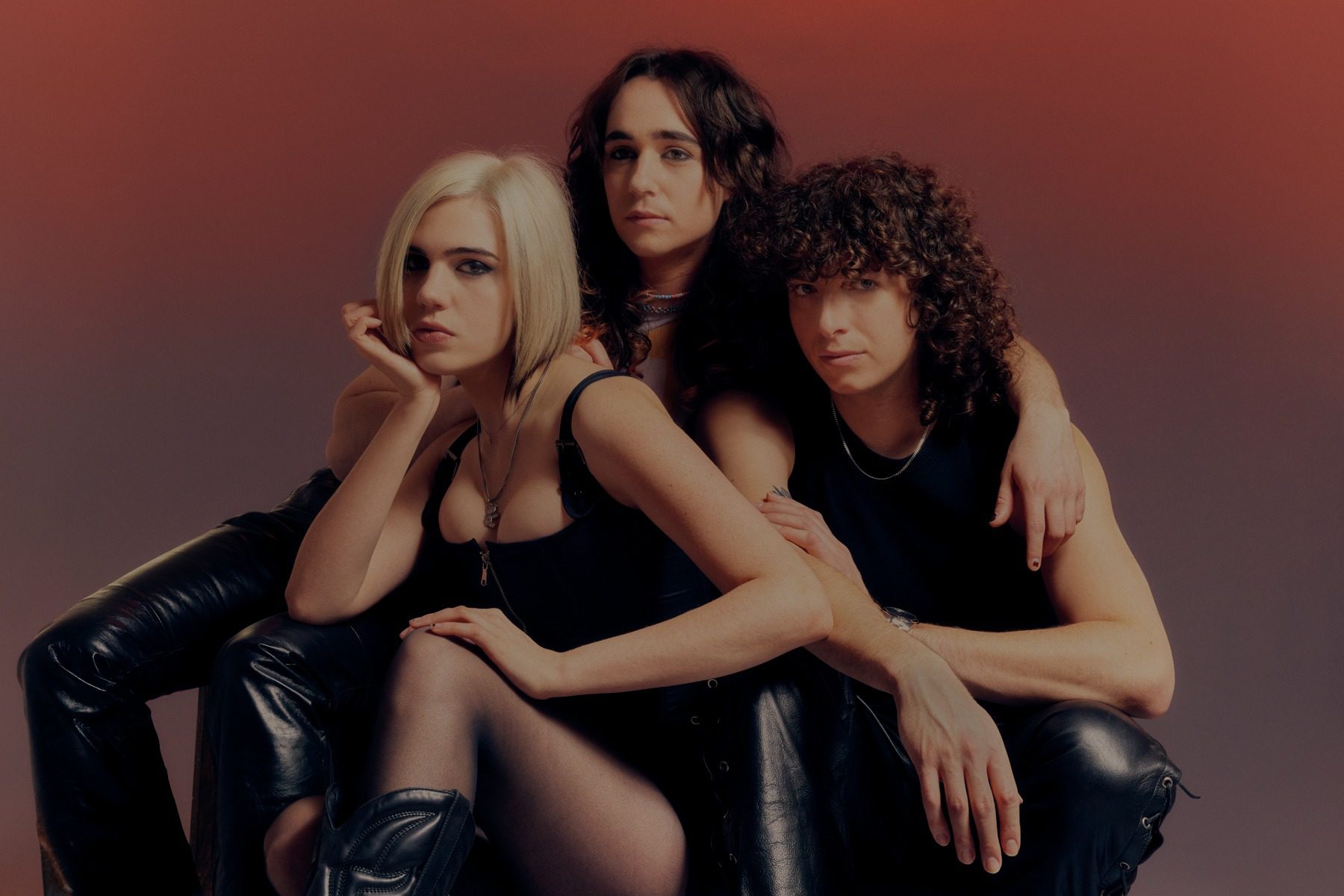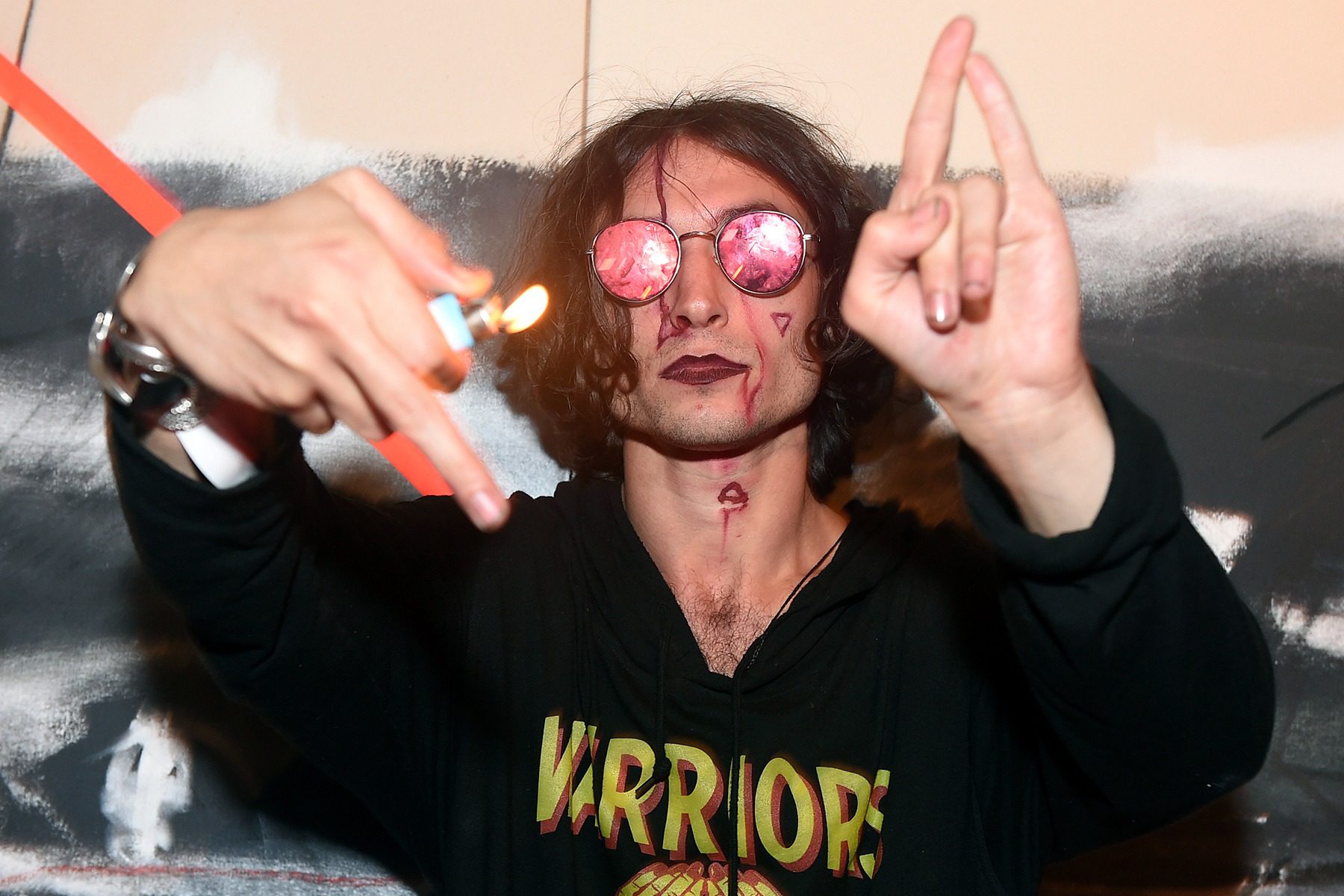
‘A Whole New Ride’: The Bold, Brash Return of Sunflower Bean
In the spring of 2020, Julia Cumming felt lost. The pandemic had just shut down live music, disrupting countless livelihoods, and for Sunflower Bean — the New York rock trio with such a ceaseless commitment to performing in bars, clubs, and theaters that they were once named the city’s hardest-working band by a local listings site — it hit with particularly dizzying force.
“Those first 10 weeks were bleak,” says Cumming, Sunflower Bean’s bassist and one of two lead singers in the band. “So much of my self-worth was based on being a performer. All the parts of myself that I liked. Having that removed was like an identity crisis.”
Stuck at home in Manhattan as the virus raged outside her door, she didn’t know where to begin. Neither did Nick Kivlen, the band’s guitarist and co-lead vocalist, who hunkered down with his parents and younger sister on Long Island and gave up on ever touring again.
“I was like, ‘Well, I had a really crazy early twenties, and I’m glad I got all those experiences,’” says Kivlen. He compares the suddenly unmoored feeling that followed to “an ego death: ‘I don’t really matter at all. My art doesn’t matter.’”
blogherads.adq.push(function () {
blogherads
.defineSlot( ‘medrec’, ‘gpt-dsk-tab-article-inbody1-uid0’ )
.setTargeting( ‘pos’, [“mid-article”,”mid”,”in-article1″,”mid-article1″] )
.setSubAdUnitPath(“music//article//inbody1”)
.addSize([[300,250],[620,350],[2,2],[3,3],[2,4],[4,2],[640,250]])
;
});
Olive Faber, the band’s drummer, spent the early weeks of 2020 wrestling with a deeper existential question at her Brooklyn apartment. By the time lockdown began, she was on her way to realizing that the male identity she’d been living uneasily with for years was all wrong. “The pandemic truly gave me the time to sit with myself, and try to figure out who I am off of tour,” says Faber. “And in that time, my egg cracked. I realized I was trans. I am trans.”
If the pandemic era began as the hardest thing Sunflower Bean had ever been through, it ended up bringing an electrifying new sense of freedom and closeness to a group that began when all three members, now 26, were in their teens. Their third album, Headful of Sugar, out May 6, is a riotous rush of melodic hooks, rhythmic energy, adventurous production, and an uncontainable passion for life as a rock & roll band that the last two years have only made stronger.
“It feels really good,” Kivlen says. “There’s this thing that I thought would never happen again — and now, with this record coming out, it’s like, maybe we’re about to go on a whole ‘nother ride. It’s exciting.”
When Cumming thinks back to her early life in downtown New York as the only child of a doctor and “a hardcore Beatles obsessive,” one moment stands out with an almost messianic clarity. “My first memory is of being like, ‘I want to be in the Beatles too,’” she says. “Four years old, standing in the playground.”
By fifth grade, she had landed her first gig as a merch assistant on tour with her friend Rachel Trachtenburg’s family band. “I got paid $5 a night,” she says. “I would go through the crowd, holding CDs. People found it really hard to turn down an 11-year-old girl.”
It was a life-changing experience, and she knew it. “I just loved everything about it,” she continues. “I went on my first tour, and you can’t really come back. You’ve been with adults trying to talk to you in bars. It does affect you.”
Cumming went on to spend ages 13 through 16 performing in Supercute!, a twee-pop group with Trachtenburg — not quite the Beatles, but another step closer to her dream. “I didn’t play an instrument, had never written a song, didn’t know if I could sing,” she says. “I had no talent or proof, or really any direction besides a feeling within myself that this was the only cool thing worth trying to do.”
blogherads.adq.push(function () {
blogherads
.defineSlot( ‘medrec’, ‘gpt-dsk-tab-article-inbody2-uid1’ )
.setTargeting( ‘pos’, [“mid-article2″,”mid”,”in-article2″,”mid-article”] )
.setSubAdUnitPath(“music//article//inbody2”)
.addSize([[300,250],[300,251],[620,350],[2,4],[4,2],[3,3],[2,2]])
.setLazyLoadMultiplier(2)
;
});
A few miles east on Long Island, a teenage Kivlen was playing bass in a local band called Turnip King, while his high school classmate Faber was making the switch from saxophone to drums. When the two suburbanites met the sophisticated city kid in 2013, the bond was instantaneous. None of the three spent more than a year in college before bailing to focus on conquering Brooklyn’s indie scene. “I was a poli-sci major,” Kivlen says. “I was interested in that stuff, but at the end of the day, I was like, ‘I have a gig at Death by Audio tonight. I’m not going to be doing the reading.’”
“We were arrogant,” he adds. “We had this dead-on belief in ourselves. It was like a calling.”
The space where Sunflower Bean have gathered for their first major interview since the pandemic is the same place where they honed their sound back then: the unfinished basement of the Faber family house on Long Island, tricked out over the past nine years with DIY psychedelic lighting, tons of instruments and gear, a mixing desk, an unusually large number of clocks, and a pink-white-and-blue trans-pride flag on one plain white wall.
“When we started, it was very much that Kurt [Cobain] quote: If you don’t practice for five hours a day, you’re not even a band,” Cumming says. “We’re lucky no one has ever complained.” Adds Faber, “My mom would just say, ‘Close the windows,’ because you can definitely hear it down the block.”
Sunflower Bean’s loud riffs and theatrical flair were oddities in the waning years of indie rock’s blog era. “A lot of bands in Brooklyn at that time were more measured,” Kivlen says. “It was not cool to promote yourself. It was not cool to wear stage costumes. It wasn’t cool to play guitar solos. We were much younger than everyone else, and we were just like, ‘We love Led Zeppelin, we love Black Sabbath, we love the Ramones, and we’re going to forefront all this stuff that you might think is corny.’” Standing out wasn’t an immediate ticket to success, he adds: “We played so many shows to empty rooms, but there wasn’t another option.”
Soon, though, their relentless approach to being a band paid off in a steadily building wave of attention and praise for their first two albums, released in 2016 and 2018. “In a lot of ways, I had experiences that made me such an adult,” Kivlen says. “Signing a record deal when you’re 19 is a very adult experience. Having business managers and publicists, that’s a very adult experience, too. But then there are certain things that you don’t get to experience, like having a long-term relationship or having your own apartment.”
blogherads.adq.push(function () {
blogherads
.defineSlot( ‘medrec’, ‘gpt-dsk-tab-inbodyX-uid2’ )
.setTargeting( ‘pos’, [“mid”,”mid-articleX”,”in-articleX”,”mid-article”] )
.setSubAdUnitPath(“music//article//inbodyX”)
.addSize([[300,250],[300,251],[3,3],[620,350],[2,2]])
.setLazyLoadMultiplier(2)
;
});
When the music stopped in 2020, they began to realize some of what they’d missed in those years of frequent touring. “It’s very nomadic, especially the way we did it,” Cumming says. “Your family has birthdays, you can’t really go. Things happen, you don’t have to engage. You’re in suspended reality. It’s a survival technique, and it’s a running-away technique as well, and an arrested-development technique.”
By the late spring of 2020, Sunflower Bean had been apart for longer than any time since they formed the band. Cumming adopted a senior cockapoo (“She’s 17 pounds of cuteness, she sleeps 18 hours a day, and she’s the love of my life”), started antidepressants, and began to see a way out of the fix they were in. After a first, tentative backyard band meeting, they decided to get back to the demos they’d begun writing the previous year.
“We all got Covid tested, drove upstate, and recorded there for six months,” Kivlen says. “We were just so happy to be reunited. We had a huge party the first night.”
Working at a rented house in the Catskills was new for Sunflower Bean, who are typically more at home in an urban setting. “We’ve never been a band that’s like, ‘Let’s go to a cabin in the woods and make an album,’” Faber notes wryly. But it worked. “Things were pretty desperate when we weren’t together,” Cumming says. “By the time we were all able to be in the same place, things just started flowing.”
Unplugged from city life, Kivlen found himself writing songs with a new ease. “It was hard for me when I was 19 to write lyrics,” he says. “You’re naïve and young.” Now, he says, “I felt like I went through a second puberty when I was 24, where I grew an inch and my voice got deeper and I could sing better. All of a sudden, for the first time ever, when we were writing I felt like I didn’t have one hand tied behind my back.”
They worked mostly uninterrupted until that June, when George Floyd’s murder by a Minneapolis cop ignited a nationwide uprising against racism and police brutality. Sunflower Bean, all three of whose members are serious about progressive politics and coalition-building, didn’t want to sit by idly. “Being in our magical little writing bubble didn’t feel like the right thing to be doing,” Cumming says. “It felt like, ‘This is our city, we should be there.’”
blogherads.adq.push(function () {
blogherads
.defineSlot( ‘medrec’, ‘gpt-dsk-tab-inbodyX-uid3’ )
.setTargeting( ‘pos’, [“mid”,”mid-articleX”,”in-articleX”,”mid-article”] )
.setSubAdUnitPath(“music//article//inbodyX”)
.addSize([[300,250],[300,251],[3,3],[620,350],[2,2]])
.setLazyLoadMultiplier(2)
;
});
Packing up their tour van with supplies, they drove back to New York to support Black Lives Matter protesters the best way they could think of. “We made little packs with Band-Aids and snacks and information on who you can call if you get arrested,” Cumming says. “Leaving at six, driving five hours a day, coming back at night — three or four times a week, that whole summer.” They funded their supply runs in part with donations from other indie musicians through the band’s Venmo: “Parquet Courts sent us some money,” Cumming says. “Maggie Rogers sent 500 bucks.”
Back in the Catskills, the songs kept coming. Kivlen wrote “In Flight” — a gorgeous, dreamy psych-rock ballad about small-town malaise — after waking up around 5 a.m. one morning in the country. “I listened to ‘There Is a Light That Never Goes Out’ five times and took a walk around the town, and then I listened to ‘Losing My Religion’ a couple of times, and I sat on the porch while everyone was asleep and wrote maybe 80 percent of the chords and lyrics right then and there,” he says. “By 5 p.m., we had this song that we were all really happy with.”
That summer is also when Faber came out to her bandmates, following through on a process of self-discovery that had begun the prior year. She connects it to her decision to quit drinking after a frightening moment on the second night of Sunflower Bean’s 2019 tour with Beck and Cage the Elephant: “I was passed out on my back, throwing up in my mouth,” she recalls. “It was like, ‘I need to stop, because it’s scary.’ And once I stopped, that made space in my brain and heart for other things about myself.”
After that tour, she faced feelings she’d been pushing away for a long time. “The biggest cracking moment was when I shaved my mustache in January 2020,” Faber says. “I would look in the mirror, and it never made sense to me. Once I shaved it, I saw my face, and I was like, ‘Oh, I’m a girl.’”
Months later, talking to Cumming and Kivlen, Faber felt a sense of relief. “They’re pretty much my closest friends, and it took a lot to even come out to them at first,” she adds. “But they’ve been nothing but supportive.”
blogherads.adq.push(function () {
blogherads
.defineSlot( ‘medrec’, ‘gpt-dsk-tab-inbodyX-uid4’ )
.setTargeting( ‘pos’, [“mid”,”mid-articleX”,”in-articleX”,”mid-article”] )
.setSubAdUnitPath(“music//article//inbodyX”)
.addSize([[300,250],[300,251],[3,3],[620,350],[2,2]])
.setLazyLoadMultiplier(2)
;
});
With their time in the Catskills ending, Sunflower Bean returned to New York and met up with producer and engineer Jake Portrait (Alex G, Empath) at his Greenpoint, Brooklyn, studio, taking extra Covid precautions to protect Portrait’s newborn baby. “We had to get tested before we went in every time,” Cumming says. “And it was the super-long CityMD line, so I would wake up at 5 to get on the line at 6 for when the doors open at 8, in the dark, that winter. … We just kept working. We were holding on to, ‘This is it, our third record. This is really important and special to us. How do we make it the coolest thing possible?’”
Faber engineered Headful of Sugar alongside Portrait, building on self-taught recording skills that date back to her time “messing with GarageBand since I was an early teenager.” Together, they gave the new album a bright pop gloss that’s surprising and thrilling after two comparatively straightforward rock LPs.
“Me and Nick got really into Mike Dean’s production,” Faber says, referencing the Houston legend who’s worked closely with Kanye West and Travis Scott. “We started to approach the recording like, ‘Fuck it — four-bar drum loop.’ We weren’t afraid to let go of rock-band clichés where you’re all in a room playing everything live and doing a billion takes. We wanted to throw that out the window.”
Faber notes proudly that the final album features exactly zero guitar amps: “Why would I take hours to set up a mic in front of an amp when I could just download this sick amp-simulator plug-in that makes it sound like no one else?”

Hair & color by Chelsey Pickthorn, makeup by Andrew D’Angelo, styling by Amber Simiriglia. Julia’s top by Dana Foley, shoes by Jeffrey Campbell, jewelry by Wendy Nicol & Heaven by Marc Jacobs. Olive’s top by Collina Strada. Nick’s shirt, vintage.
Evelyn Freja for IndieLand.
Those production choices mirror a newly bold approach to songwriting and vocals, as heard on the single “Roll the Dice.” “I can be a confrontational, aggressive person,” Cumming says. “Sometimes it harms me, and sometimes I feel like it’s my gift. But when it comes to songs, that’s a fun way for it to come out.”
She cites her lyrics on “Stand by Me,” an insistently catchy pop song questioning a partner’s dedication (“You want a girl who sits back and takes it/That’s not the way that I play”). Though the song features co-writes by Weezer producer Suzy Shinn and alt-pop auteur Shamir, Cumming describes it in strikingly personal terms.
blogherads.adq.push(function () {
blogherads
.defineSlot( ‘medrec’, ‘gpt-dsk-tab-inbodyX-uid5’ )
.setTargeting( ‘pos’, [“mid”,”mid-articleX”,”in-articleX”,”mid-article”] )
.setSubAdUnitPath(“music//article//inbodyX”)
.addSize([[300,250],[300,251],[3,3],[620,350],[2,2]])
.setLazyLoadMultiplier(2)
;
});
“When you’re performing and you’re a woman, you think about the fact that by the time you’re 36, you’re expected to be a mom,” she says. “That gives me 10 more years of a professional life, or of being seen as a person with value. That does inform some of the confrontational elements of this record. … Having to at least consider throwing that away for the chance to prioritize making art.”
The band finished Headful of Sugar last summer, getting in some final recording at Electric Lady Studios on the day of the NYC Pride March in June 2021. “I spent the entire summer going to parties and stealing the aux cord and playing the album,” Kivlen says. “I would do DJ sets and play our entire record just because I was craving some affirmation about it. ‘Oh, are you bartending tonight? I’m going to come in. I brought a dongle.’ We were ready.”
Downstairs in their basement headquarters, Sunflower Bean huddle together to watch Cumming smash a beer bottle over someone’s head in a mosh pit. They rewind the scene on the monitor a few times, making sure the mayhem looks just right for the latest cut of their “Roll the Dice” music video — a sequel to the one they made for lead single “Who Put You Up to This?,” in which Kivlen and Faber aid and abet Cumming in a double-cross robbery plot that is now climaxing with a closing shot of her sitting on a barroom floor, nose bloodied and surrounded by cash, as sirens echo.
“That’s the end of the story,” Kivlen says. “We’re not gonna franchise the ‘Julia is a criminal’ universe.”
They spent six months Zooming with potential video directors before writing a treatment on their own, inspired by Quentin Tarantino’s Jackie Brown, and connecting with a young director named Josefine Cardoni. “We kept getting all these treatments that were like, ‘OK, you’re dressed as clowns and you’re robbing a grocery store, and then you’re in a rowboat.’ All this fantastical stuff,” Kivlen scoffs. Budgets were another factor: “We talked to a lot of directors who said, ‘I don’t do videos for less than $50K,’” he adds. (“$60K!” Cumming chimes in.)
Outside in the driveway, the van is waiting to be packed up for a few dates in New England with Empath opening. Cumming, Kivlen, and Faber all sound excited about getting back to touring, strengthened by the new senses of self they’ve each developed since the last time they were on the road.
blogherads.adq.push(function () {
blogherads
.defineSlot( ‘medrec’, ‘gpt-dsk-tab-inbodyX-uid6’ )
.setTargeting( ‘pos’, [“mid”,”mid-articleX”,”in-articleX”,”mid-article”] )
.setSubAdUnitPath(“music//article//inbodyX”)
.addSize([[300,250],[300,251],[3,3],[620,350],[2,2]])
.setLazyLoadMultiplier(2)
;
});
“I made a lot of friends during the last year that don’t think of me as a musician at all,” Kivlen says. “I’m dating someone right now who has only ever seen me play a show once. When I meet her friends, they don’t know me as any band member.”
Faber began telling people her new first name, Olive, in December, and is still getting used to how right it feels. “It took me a minute to be like, ‘This is my name,’” she says. “But it feels like me, which is crazy, because the name I was given never did.”
Cumming, for her part, has found a new perspective on what makes her life meaningful.
“The idea that you can control anything … You can book a show, it will be canceled,” she says after a pause. “The only thing that matters is: Are you happy with the people you’re around? Are you safe? Are you healthy? Do you have love? … There’s been sacrifice, heartache, and pain. But making music is worth fighting for.”




